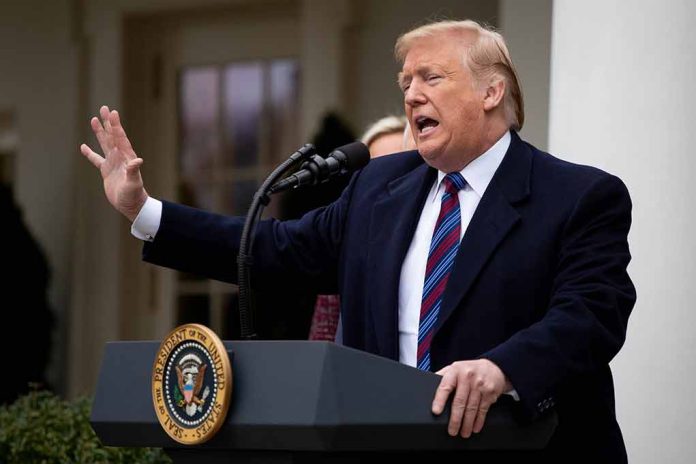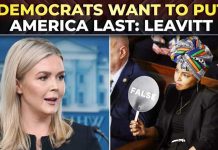
President Trump’s recent dismissal of two Democratic FTC commissioners has ignited a fierce debate about executive power and agency independence.
Key Takeaways
- President Trump terminated Alvaro Bedoya and Rebecca Kelly Slaughter from the FTC, testing the limits of executive control over independent agencies.
- Both commissioners plan to sue, claiming their dismissals are illegal and that they still rightfully belong to the FTC.
- This action paves the way for Trump to appoint commissioners more aligned with his policies.
- Legal battles could arise, impacting presidential powers and independent bodies like the Federal Reserve.
- The White House maintains that Trump has constitutional authority to manage executive personnel including the FTC.
Trump’s Action on FTC Commissioners
President Donald Trump fired Alvaro Bedoya and Rebecca Kelly Slaughter, two Democratic members of the Federal Trade Commission. This move has escalated the White House’s efforts to exert more influence over independent regulatory agencies. Critics on the left argue these dismissals could enable the president to appoint individuals aligned with his policies, fundamentally affecting the FTC’s ability to function independently.
The dismissed commissioners labeled their removal as unlawful and are preparing to challenge the decision in court, asserting their continued membership in the FTC. Bedoya – who was appointed by former President Biden – railed against the decision, stating, “The president just illegally fired me. This is corruption plain and simple,” highlighting the underlying tension between maintaining agency autonomy and presidential authority.
Pres Trump sets up what will be a seminal Supreme Court case by dismissing two Democratic FTC Commissioners leaving just two Republicans. This is in clear contravention to a "1935 Supreme Court case known as Humphrey’s Executor v. United States, [which] upheld job protections… pic.twitter.com/o3U93dpiB6
— Neil Sethi (@neilksethi) March 19, 2025
Supporting and Opposing Views
FTC Chair Andrew Ferguson, appointed by Trump, supports the president’s right to remove commissioners. The FTC, designed as an independent regulator, typically includes three members from the president’s party and two from the opposition, aiming to maintain a balance. However, Bedoya and Slaughter argue that the agency’s independence is protected by past Supreme Court rulings, allowing removal only for cause.
The FTC, as an entity, is designed to enforce consumer protection and antitrust laws without undue influence. Slaughter has been quoted saying, “Law protects the independence of the Commission because the law serves the American public, not corporate power.” This epitomizes a broader concern that the commission could turn in favor of corporate interests over public needs without its supposed independence.
Legal Implications of the Firings
The firings contest a Supreme Court precedent set in Humphrey’s Executor v. United States, which limits the president’s ability to remove FTC commissioners without cause. As the situation unfolds, it poses a significant question regarding executive power over supposedly independent governmental agencies, leaving experts pondering long-term impacts on the separation of powers.
“The FTC is an independent agency founded 111 years ago to fight fraudsters and monopolists,” Bedoya reiterated, reflecting concerns about undermining the agency’s original mission and potentially compromising economic stability by setting a dangerous precedent.
This unfolding case may define executive power limits, offering both immediate and long-term implications for future administrations, including the judicial interpretation of the executive branch’s reach over independent regulatory bodies.
Sources:
- Trump fires 2 Democrats on the Federal Trade Commission, seeking more control over regulators | AP News
- White House pledges to defend FTC firings in court
- Trump fires both Democratic FTC commissioners, setting stage for legal brawl



